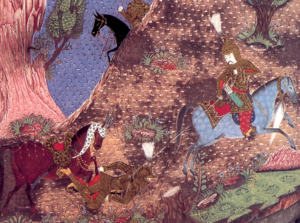Battle of Kosovo (1448)
| Second Battle of Kosovo | |||||||
|---|---|---|---|---|---|---|---|
| Part of the Ottoman wars in Europe and Ottoman-Hungarian Wars | |||||||
 An Akıncı irregular defeating a Hungarian knight. |
|||||||
|
|||||||
| Belligerents | |||||||
|
|
|
||||||
| Commanders and leaders | |||||||
| Murat II | Vladislav II | ||||||
| Strength | |||||||
| ~ 40,000 to 60,000 | 24,000-30,000 men | ||||||
| Casualties and losses | |||||||
| unknown | 17,000 | ||||||
The Second Battle of Kosovo (Hungarian: második rigómezei csata, Turkish: İkinci Kosova savaşı) (17 October–20 October 1448) was fought at Kosovo Polje between a coalition of the Kingdom of Hungary and Wallachia led by John Hunyadi, against an Ottoman-led coalition under Sultan Murad II. The result of the battle was a decisive Ottoman victory.
In 1448, John Hunyadi saw the right moment to lead a campaign against the Ottoman Empire. After the defeat at the Battle of Varna (1444), he raised another army to attack the Ottomans. His strategy was based on an expected revolt of the Balkan people, a surprise attack, and the destruction of the main force of the Ottomans in a single battle.
In September 1448 Hunyadi led the Hungarian forces across the Danube river and camped them in Serbia next to Kovin, just outside the Serbian capital of Smederevo. For a full month the Hungarians were encamped there awaiting the German crusaders, the Wallachian Duke as well as the Bohemian and Albanian army. The Albanian army under Skanderbeg did not participate in this battle as he was prevented from linking with Hunyadi's army by the Ottomans and their allies. It is believed that he was delayed by Serbian despot Đurađ Branković, then allied with Sultan Murad II, although Branković's exact role is disputed. As a result, Skanderbeg ravaged Branković's domains as punishment for deserting the Christian cause.
...
Wikipedia
